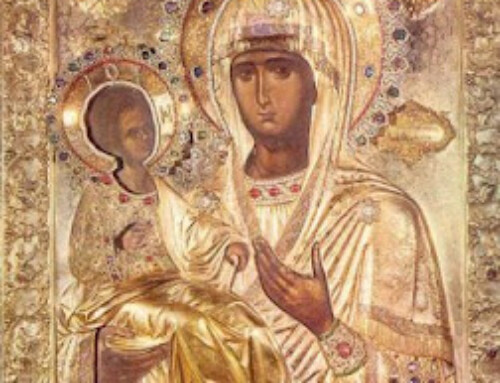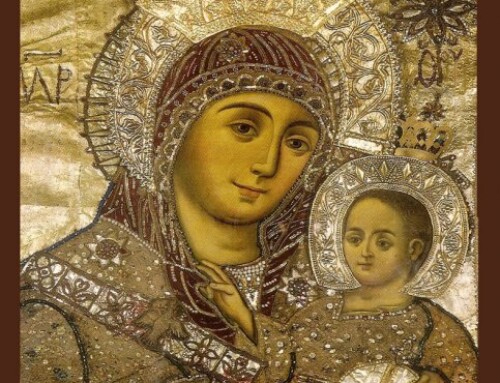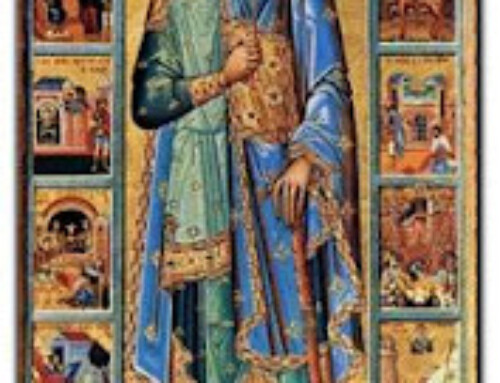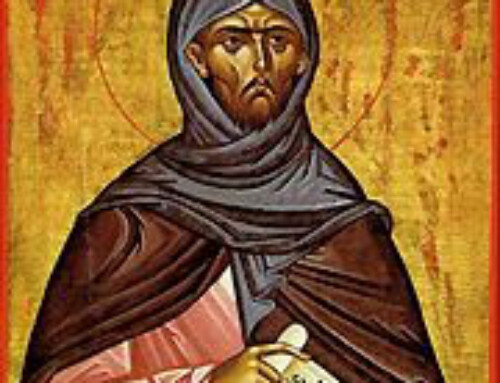Word Magazine June 1977 Page 13
ST. IGNATIUS OF ANTIOCH
By Fr. Constantine Nasr
Ignatius, Bishop of Antioch, was most probably born in Syria in 35 A.D.; he was of pagan origin and a persecutor of Christians before his conversion. According to Origin, he was the third Bishop of Antioch. Little is known about his early life except for his journey to martyrdom from Antioch to Rome, under a guard of ten Roman soldiers.
It was in the year 107 A.D. that Trajan, a Roman Emperor, came back victorious from the war against the Dacians and Scythians, and as he entered the glorious city of Antioch, he let the Christians know that the persecution against them was not yet over.
Ignatius’ voice was heard throughout Antioch, “Keep on praying for those who persecute you. Return their bad temper with gentleness, their boasts with humility, and their violence with mildness. Never be eager to retaliate. Try to please not yourselves but God.” Trajan summoned Ignatius and condemned him to death.
On his journey to Rome, Ignatius was received with great honor at Smyrna by St. Polycarp, and was visited by members of the many neighboring Christian communities. Ignatius wrote to the Churches of the Ephesians, Magnesians, Trallians, Romans, Philadelphians, Smyrnians, and to Polycarp, Bishop of Smyrna. In all of these letters, Ignatius expressed his steadfast love to his Faith in Jesus Christ, so he writes “Jesus is the one who for our sake suffered death that we might believe in Him, so that we escape from this earthly world. Jesus is our hope, and if we live in union with Him now, we shall gain eternal life.” He proceeded to say, “Be imitator of God as I had been.”
Ignatius was not a foolish man, nor did he doubt the teachings of the Apostles and the Disciples. Rather, he stood firm in defending the Church against the heretical teachings which appeared during his time; especially Docetism, which means “appearance or representation of something not existing in reality.”
He did not exaggerate or generalize the true reality of Christ, but he believed in Him and accepted to endure the chains and the cruelty as a prisoner fighting the beasts … all this was not in vain. His purpose in life was to enlighten the local churches to stand like the rock, steadfast love to their Faith no matter what obstacles they may have to face.
CHRISTOLOGY AND ECCLESIOLOGY
One cannot ignore the Christology of St. Ignatius in his letters against the heretical movement of Docetism. In his letters he affirmed his belief against those who denied the reality of Christ’s life, death, and resurrection. “In faith which is the flesh of the Lord, and in love which is the blood of Jesus Christ.” (Trollians XIJI: I). He continued to say. . . “Jesus was really born, ate, and drank, was really persecuted under Pontius Pilate, was really crucified and died in the sight of heaven and earth, who was really raised from the dead, when His Father raised Him up, in the same manner His Father shall raise up in Christ Jesus, for us who believe in Him, for without whom we have not true life.”
The Christology of St. Ignatius cannot be separated from his Ecclesiology. For him, the Church, or the local church, represents Christ Himself. The Church is considered to be the center of all things; in it the faithful will gather for worship and for partaking of the Eucharist. The Church itself reveals to us the birth, the death, and the resurrection of Christ. To Ignatius, the Church is one because it has one Lord, Jesus Christ; “Where Jesus Christ is, there is the Catholic Church.”
UNITY IN THE HIERARCHY
The central theme of his teaching is that the unity of the faithful present in the Church must have one prayer, one petition, one mind, and one hope dominated by love for Jesus Christ. He believed in the Bishop as the representative of Jesus Christ. In turn, the Bishop is the center of the Church, for he is the one who celebrates the Eucharist. He states, “That there is one Bishop with the Presbytery, and the deacons, my fellow servants.” He continues to say that the faithful must be obedient to the Bishop. “Let no one do any of the things appertaining to the Church without the bishop, see that you all follow the Bishop as Jesus Christ follows the Father, and the Presbytery as if it were the Apostles, and reverence the deacon as the command of God.”
Besides the sacramental emphasis on the Church, the responsibility of the Bishop towards his flocks and the obedience of the flocks towards their Bishop, one finds another theme pertaining to St. Ignatius’ Christology: the ethical and moral teachings of the Church. Faith and love are the key words for St. Ignatius’ ethics. It is by faith and love that Christians become new creatures (Trollians VIII:8). Faith, love, and obedience are the foundation of his teaching. It is through his faith for Jesus Christ that he wrote his Epistles; it is through his deep love for the Incarnate One that he accepted martyrdom; it is through his obedience to the teachings of the Church that he wanted to warn the Christians to be ready on guard against false teachings.
Finally, to St. Ignatius, to be a Christian is to be liberated from the fear of death, and this comes about by acceptance of the Cross and by self-giving. The reality of the Cross can be found alive in the Church, in the Bishop, and in the congregation as one organic unity, and above all, in the Eucharist itself.
St. Ignatius’ memory is celebrated on December 20th, and with grateful hearts the Orthodox Faithful chant the Troparion, “Holy Hieromartyr Ignatius, you lent yourself to the Apostles’ way of live and succeeded them on their throne. Inspired by God, you found the way to contemplation through practice and prayer; wherefore you became a perfect teacher of truth, fighting for the faith unto the shedding of your blood. Intercede with Christ that He may save our souls.”
Father Constantine Nasr is pastor of St. George Orthodox Church in Cedar Rapids and is Dean in that area.





